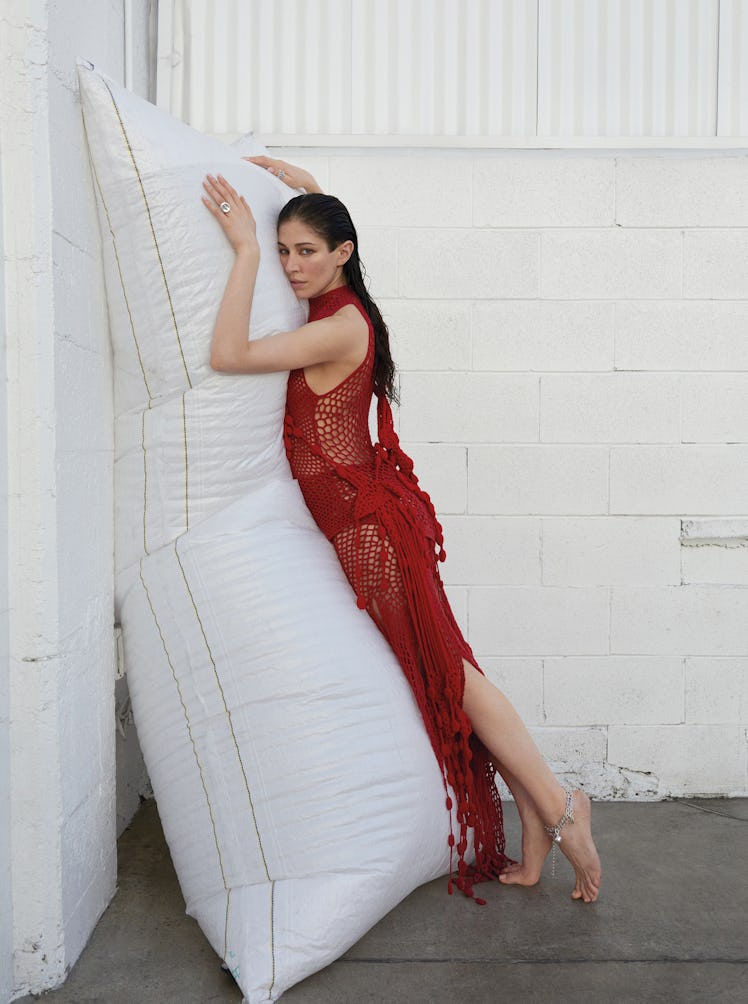Caroline Polachek Will Forever Be an Alt Girl at Heart

Caroline Polachek made her presence known as a powerful solo artist back in 2019, when she released her debut album, Pang. The former frontwoman of the synth-pop group Chairlift released a project that became an instant hit—especially the single “So Hot You’re Hurting My Feelings,” which ended up making her a household name (and inspiring a TikTok trend). For the past three years, Polachek has steadily been making hits, including “Sirens,” a collaboration with the DJ Flume; he brought Polachek out to Coachella this year, where she sang the song, performing for the very first time on a stage of her own. Below, the 36-year-old New York native describes the overwhelming feeling of performing on an arena tour, living two parallel existences, and “kneeling at the altar of alternative music.”
After many years in the Brooklyn indie scene as the lead singer of the band Chairlift, you started performing solo in 2013, first under the monikers Ramona Lisa and CEP, and now using your own name. What did that open up for you?
When I started working under my own name, I wasn’t in a band surrounded by dudes and amplifiers. I could really start thinking about, What do feelings look like? What does a coming-of-age as a woman look like? What does it sound like? What does feminine guilt look and sound like? What does ecstasy look and sound like?
You lived in Tokyo until you were 6 years old.
I remember being around a lot of minimal, peak 1980s Japanese architecture. And I watched a lot of cartoons on TV, even though I couldn’t really understand them. My favorite show, Magical Angel Creamy Mami, was about this ordinary girl who had the power to transform herself into a pop star. If you had told me that I would one day get to have parallel existences—being a normal girl half the time, and then touring arenas doing pop shows the rest—I wouldn’t have believed you.
When did you realize that you wanted to pursue music in a serious way?
There were a few turning points: first, when I realized I was able to write songs; next, when I realized that people liked the songs I wrote; and then third, understanding that I might just have a shot at doing this professionally. That came much later. I grew up in the ’90s watching MTV and VH1, and I was really sold on this idea from reality shows that the music industry was this major-label mafia. Truthfully, it has changed so much since then. But I had this real sense that you had to get discovered while singing at a gas station or something. Getting discovered felt completely out of reach. So I really just approached music as a passion, but it was one that I increasingly dedicated more and more of my time to.
You just finished a tour with Dua Lipa. How do you feel performing live?
With an arena tour, you’re like a tiny ant singing out into the cosmos. You can’t even see most people’s faces in the arena, just the people directly in front of the stage. Especially after the pandemic, when all of our worlds became very small, it was a really overwhelming experience. I actually had to stop myself from crying a couple of times because it was so beautiful.
Is there a place where you’re most yourself, literally or conceptually?
When I’m busy, when there is a flow of exciting ideas and I don’t have too much time to think.
Bottega Veneta dress; Plutonia Blue large ring; her own ring.
Is there a way that you want people to experience your music, or connect to it?
I feel like the music really suits being in motion, whether that’s in a more abstract sense within someone’s own life, or in a car or in headphones or on a plane. I think that’s a great place to experience it for the first time.
How do you feel about the term “pop star”?
I think it’s very slippery and interpretive. The biggest artist in the world could reject the idea of being a pop star or, alternatively, the smallest artist could claim to be a pop star, and they would both be correct. I grew up kneeling at the altar of alternative music. Björk and Kate Bush and Fiona Apple were my absolute heroes when I was a teenager. I also admire how they refused to play by the rules and continue to do what they do without limits. I aspire to do that in my own way in today’s music landscape—to create my own lane, rather than aim what I do toward radio or stats or the idea of the mainstream. It’s the idea of being as me as I can possibly be. In that sense, I don’t aspire to be a pop star. I aspire to be an alt girl.
Hair by Dylan Chavles at MA+ Group; makeup by Grace Ahn at Julian Watson Agency. Set design by Lauren Machen at Lalaland Artists.
Photo assistants: Jorge Solorzano, Nick Tooman, Chris Whitaker; retouching: D-Touch; fashion assistant: Antonio Soto; hair assistant: Alison DeMoss; makeup assistant: Christina Roberson; set assistant: Kevin Carniero; tailor: Irina Tshartaryan; production assistant: Asher Gardner; special thanks: the Revery LA.
This article was originally published on